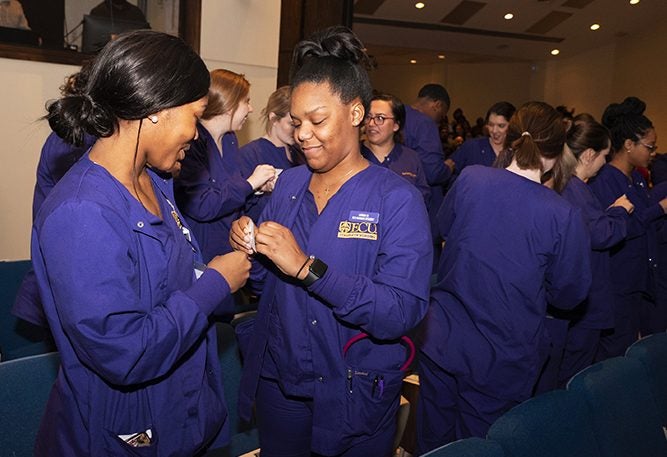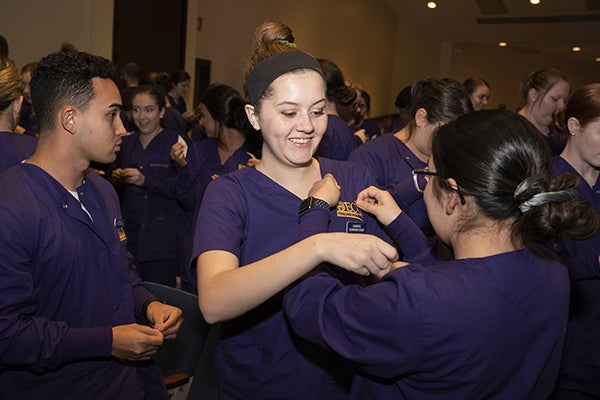ECU College of Nursing welcomes its most diverse BSN class
The ECU College of Nursing celebrated its most diverse class of future nurses ever as it welcomed 144 Bachelor of Science in Nursing (BSN) program and Accelerated Second-Degree BSN (ABSN) students during the college’s biannual Lamp of Learning ceremony on Jan. 23.
Loved ones beamed as students crossed the stage in the Brody School of Medicine auditorium to receive a gold lamp pin signifying service and light. The ceremony serves as the students’ official welcome to the college’s BSN and ABSN programs.
More than 30% of the new BSN class are minority students and 17% are male, making this the most diverse of any entering BSN class on record. The college has recently averaged about 20% minority students and 10% male students.

Nursing student Latasia White prepares to pin another student with the lamp pin that each student receives as part of their welcome into the College of Nursing during the Lamp of Learning Ceremony on Jan. 23. (Photos by Jeremy Smith)
Improving diversity in the College of Nursing is important to create a workforce of health care providers that is representative of the patients they will serve.
“At the College of Nursing, we emphasize how we live in a global, multicultural society, so we’re very excited to see the pool of diverse applicants increasing,” said Dr. Sylvia Brown, dean of the College of Nursing. “We work to prepare our nurses to collaborate with health care providers from all walks of life and to meet the wide-ranging needs of all the patients they’ll care for.”
The lamp symbol, representing the founder of modern nursing, Florence Nightingale, also appears on the pin that students receive upon graduating.
During the ceremony, Brown reminded students that nursing is a profession steeped in tradition and the pin they were receiving, as well as the pin will receive at graduation, should serve as a reminder of the traditions of nursing. These traditions include global service and care, trustworthiness and working to address all aspects of a patient’s well-being.
Brown also pointed out the ruby that serves as the flame emanating from the lamp in the College of Nursing pin.
“The ruby stands for a vibrant life,” Brown said. “Each of you are a vibrant life, and the patients that you’ll care for are a vibrant life as well.”
Students recited the college pledge, which includes promises to respect patient confidentiality, to collaborate with other health professionals, to participate in the advancement of the profession and to advocate for patients.
“When I was little, I always wanted to be helping people and when anyone was hurt or sad I wanted to make them feel better,” said new BSN student Celia Karahalios. “It clicked when someone told me that was an actual job.”
Celia’s father, Bill Karahalios of Winston-Salem, traveled to watch Celia receive her lamp pin.
“I’m beaming with pride right now,” Bill said after the ceremony. “She’s always been a caring individual. Her grandmother’s in her 90s and requires extra care and Celia’s always been attentive to her.”
“It’s exciting because she’s worked really hard to get to this stage” said Celia’s sister, Roseanne Six. “We’re excited for the next couple of years and then coming back for graduation as well.”
Admission to the College of Nursing’s BSN program is highly competitive. In addition to meeting the university and college requirements, students’ scores on a required national pre-admission exam are taken into account along with their GPA, enrollment status and other factors. Students accepted into the program this fall had an average GPA of 3.59. Second-degree accelerated BSN students admitted had an average GPA of 3.53.
-by Natalie Sayewich, University Communication
